|
|||||||||
|
|||||||||
|
Special Features
War Crimes Prosecution Watch: Volume 12, Issue 23 – January 23, 2018
FREDERICK K. COX INTERNATIONAL LAW CENTER Founder/Advisor |
War Crimes Prosecution Watch
Volume 12 – Issue 23 |
Editor-in-Chief James Prowse Technical Editor-in-Chief Managing Editors |
War Crimes Prosecution Watch is a bi-weekly e-newsletter that compiles official documents and articles from major news sources detailing and analyzing salient issues pertaining to the investigation and prosecution of war crimes throughout the world. To subscribe, please email warcrimeswatch@pilpg.org and type “subscribe” in the subject line.
Opinions expressed in the articles herein represent the views of their authors and are not necessarily those of the War Crimes Prosecution Watch staff, the Case Western Reserve University School of Law or Public International Law & Policy Group.
Contents
AFRICA
CENTRAL AFRICA
- All Africa : Central African Republic: At Appeal Hearing, Defense Lawyers Say Bemba Was Denied a Fair Trial
- Punch: Case dismissed against French troops accused of child rape in Central Africa
- Times Live: In Central African Republic, militia violence leaves village devastated
- Fox News: New clashes outside South Sudan’s capital said to kill 4
- Geopolitical Monitor: South Sudan: In Search of a Path to Peace
- Abc News: South Sudan’s cease-fire broken by both sides, say monitors
- Bloomberg News: Farmers Risk Whippings as War Decimates South Sudan Breadbasket
Democratic Republic of the Congo
- Relief Web: UN announces special probe into attacks on peacekeepers in eastern DR Congo
- News 24: ICC judges ‘prejudiced’ say lawyers for DRC’s Bemba
- Relief Web: Speakers Concerned About Violent Protests over Delayed Presidential Election as Security Council Discusses Situation in Democratic Republic of the Congo
- Reuters: Congo launches offensive against Ugandan rebels in its east
- Times LIVE: UN probes DR Congo clashes that killed Burundi refugees
- Portland Press Herald: In Portland, Burundian immigrants protest presidential adviser’s visit
- All Africa: Burundi: Do Global Actors Have What It Takes to Help Burundi?
WEST AFRICA
Lake Chad Region — Chad, Nigeria, Niger, and Cameroon
- The Guardian: War against Boko Haram in Lake Chad over, says Buratai
- Sahara Reports: 4 Soldiers Killed, 107 Boko Haram Terrorists Dead in Latest Battle Around Lake Chad
- Reuters: Islamic State affiliate claims deadly attack on U.S. troops in Niger
- FDD’s Long War Journal: Al Qaeda maintains operational tempo in West Africa in 2017
- The Citizen: Three pro-government guerilla fighters killed in Mali
- Journal du Cameroun: Meeting to make G5 Sahel Force operational opens in Mali
- Reuters: Mali plans operation to flush Islamists from lawless center
EAST AFRICA
- Reuters: Congo launches offensive against Ugandan rebels in its east
- AllAfrica: The Monitor: Uganda Law Society Goes to Court to Challenge Age Limit Law
- The Citizen: Three DR Congo soldiers killed fighting Ugandan rebels
- The Star: Protests as Uhuru takes charge of top security organs
- Voice of America: Kenya Opposition Leader Vows to Inaugurate Self as ‘Peoples’ President’
Rwanda (International Criminal Tribunal for Rwanda)
- Face2Face Africa: Why Rwandan refugees in Malawi won’t go back home
- U.S. News & World Report: Woman Working on Appeal in Rwanda Genocide Case
- The New Times: States press France on Rwandan genocidaires
- The Guardian: ‘People were screaming’: troops destroy $200,000 aid camps in Somalia
- Africa News: ‘Al-Shabaab is recruiting children in Somalia’
- Reuters: Somalia’s al Shabaab denounces ex-spokesman as apostate who could be killed
NORTH AFRICA
- Reuters: Suspected Islamic State bomber surrenders at Libyan checkpoint: official
- Reuters: U.S. welcomes Libya’s destruction of chemical weapons stockpile: statement
- The Libya Observer: UN warns fighting armed groups against attacking civilians in Tripoli
- Aljazeera: Deadly clashes in Libyan capital force airport to close
EUROPE
Court of Bosnia & Herzegovina, War Crimes Chamber
- Court of Bosnia and Herzezgovina: Indictment confirmed in the Milan Todović case
- The Court of Bosnia and Herzegovina: Appeal Granted and Judgment Revoked in its Convicting Part Concerning Ostoja Stanišić
- The Court of Bosnia and Herzegovina: Indictment confirmed in the case of Branko Čigoja et al.
- The Court of Bosnia and Herzegovina: Slobodan Karagić sentenced to 12 years in prison
International Criminal Tribunal for the Former Yugoslavia
Domestic Prosecutions In The Former Yugoslavia
- Balkan Insight: Serbian Judge and Defendant Clash at Lovas Trial
- Balkan Insight: Serbian Court Sentences Eight for Ovcara Massacre
- Balkan Insight : Croatia Issues Light Sentence For 1998 Serb Killing
MIDDLE EAST AND ASIA
- The Epoch Times: Dreaded ISIS Executioner ‘White Beard’ Caught in Iraq, Could Himself Face Execution
- The National: Iraq parliament forms committee to investigate war crimes in Tuz Khurmatu
- International Business Times: Isis executioner who threw gay men off buildings bribed his way out of prison in ‘minutes’
- The New York Times: She Left France to Fight in Syria. Now She Wants to Return. But Can She?
- Reuters: Suicide attack in Baghdad kills at least 27, wounds 64
- Iraqi News: Mass grave with relics of security personnel found, north of Mosul
- Arab News: Abu Bakr Al-Baghdadi: The world’s most wanted remains at large
- Iraqi News: Policemen injured in sniper attack by Islamic State in Baqubah
- Iraqi News: Islamic State member killed as Iraqi troops repulse attack, west of Mosul
- Arab News: Opposition: World’s Silence is Killing Syrians
- BBC: Syria war: Hospitals being targeted, aid workers say
- The Huffington Post: A Bold Idea for Justice
- Human Rights Watch: Children Under Attack in Damascus Enclave
- Syrian Network for Human Rights: 329 Civilians Killed, including 79 Children, in Two Months of Escalation in Eastern Ghouta
- XINHUANET: UN mission says latest Kabul suicide attack amount to war crime
- POLITICO: Military investigating shooting in newly leaked Afghan combat video
- The Washington Post: Saudi fighter jet crashes, Yemen rebels claim downing it
- The Daily Mail: Air strikes in north Yemen kill at least 14: witnesses, rebels
- Al Jazeera News: Saudi accused of rights abuses in Yemen civilian deaths
- CNN: UN report accuses Iran and Saudis over Yemen
Extraordinary Chambers in the Courts of Cambodia
Bangladesh International Crimes Tribunal
- The Daily Tribune: War crimes trial creates scope for ending culture of impunity says special tribunal
- Dhaka Tribune: No progress on plan to confiscate war criminals’ properties
- Says probe agency; ICT asks registrar to publish ad for Khulna fugitive: Evidence found against Rajshahi man
- Dhaka Tribune: Deprived of all privileges, 5 freedom fighters face hardships in Pabna
- The Daily Star: ICT’s decision on indictment Feb 14
War Crimes Investigations in Burma
- The Daily Star: Myanmar’s deceitful admission
- Channel New Asia: Rohingya insurgents say 10 found in Myanmar grave “innocent civilians”
- The Jerusalem Post: 2017 In Numbers: Terrorists Killed 20 Israelis, 3,617 Palestinians Arrested
- Aljazeera: Israeli army raids villages after settler shot dead
- Aljazeera: Two Palestinian teenagers killed by Israeli troops
AMERICAS
- Colombia Reports: Colombia war crimes tribunal to begin hearings within 6 months: prosecutor
- Finance Colombia: President Santos Names 30 Justices to Colombia’s ‘Special Jurisdiction for Peace’ War Crimes Tribunal
- TeleSUR: Peru’s Congress Members Waiting For the Fujimori Pardon Casefile
- Miami Herald: Dramatic smart-phone video of slain Venezuelan rebel could trigger ICC probe
TOPICS
Truth and Reconciliation Commission
- Times Colonist: Achieving reconciliation in the Alberni Valley
- Zimbabwe Daily: Zim won’t progress without justice, reconciliation: Mnangagwa
- The Herald: NPRC: Achieving peace, reconciliation for all
- San Diego Union-Tribune: Brother of ISIS fighter gets 10 years in prison after informant’s testimony
- Herald Sun: AFP issues 20 arrest warrants for terror suspects
- Independent: Isis fanatic planned simultaneous London terror attacks with ‘death squad sent by Allah’, court hears
- Asia Times: Anti-piracy mission helps China develop its blue-water navy
- Seatrade Maritime News: Pirate attacks at 22-year low worldwide
- The Times of India: Indian, Japanese coast guard to hone skills to fight pirates
- Punch: Case dismissed against French troops accused of child rape in Central Africa
- Bloomberg Politics: Soldiers Committed Gang-Rapes in South Sudan’s Capital, Group Says
- The Globe and Mail: Will Canada finally deal with its Afghan war skeletons?
- Foreign Policy in Focus: Yugoslavia’s War Crimes Tribunal Showed the Promise – and Limits – of International Justice
- Balkan Insight: Kosovo Leaders’ War Court U-Turn is Self-Destructive
WORTH READING
—
You received this message because you are subscribed to the Google Groups “warcrimeswatch – War Crimes Prosecution Watch” group.
To unsubscribe from this group and stop receiving emails from it, send an email to warcrimeswatch+unsubscribe@case.edu.
International Center for Transitional Justice: In Focus – Designing Reparations Forms
|
|||||||||||||||||||||||||||||||||
|
|||||||||||||||||||||||||||||||||
|
|||||||||||||||||||||||||||||||||
|
|||||||||||||||||||||||||||||||||
|
|||||||||||||||||||||||||||||||||
|
|||||||||||||||||||||||||||||||||
|
Human Rights Watch: World Report 2018
World Report 2018 summarizes key human rights issues in more than 90 countries and territories worldwide, drawing on events from late 2016 through November 2017.
In his keynote essay, “The Pushback Against the Populist Challenge,” Executive Director Kenneth Roth says that the surge of authoritarian populists appears less inevitable than it did a year ago. Then, there seemed no stopping a series of politicians around the globe who claimed to speak for “the people” but built followings by demonizing unpopular minorities, attacking human rights principles, and fueling distrust of democratic institutions. Today, a popular reaction in a broad range of countries, bolstered by some political leaders with the courage to stand up for human rights, has left the fate of many of these populist agendas more uncertain.
Report link: https://www.hrw.org/sites/default/files/world_report_download/201801world_report_web.pdf
The Guardian: CIA rendition flights from rustic North Carolina called to account by citizens
A Gulfstream jet from a quiet airport south-east of Raleigh flew captives to be tortured around the world. The government failed to act but local people have refused to let the issue die
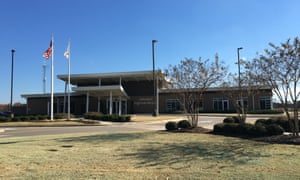
Ayear after he was released from captivity in Guantánamo, Binyam Mohamed received a letter from Christina Cowger, an agricultural researcher from North Carolina. Enclosed was a petition of apology signed by nearly 800 visitors to the North Carolina State Fair.
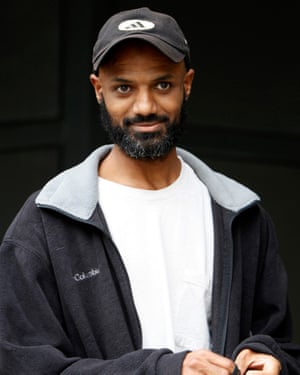
It was “a small gesture”, Cowger acknowledged, but her 2010 letter came with a commitment. North Carolina Stop Torture Now, an organization she co-founded, had been conducting protests, petition drives and legislative campaigns seeking an official investigation into an obscure firm operating flights out of her local airport.
The firm, Aero Contractors, was the CIA front company that operated the Gulfstream business jet that delivered Mohamed to a secret prison in Morocco to be tortured.
Though few government officials supported such an investigation, she wrote, the group pledged “to work toward true transparency and accountability in the United States for the crimes against you and other survivors”.
Seven years later, Cowger sat in the front row of a makeshift hearing room in the Raleigh Convention Center as 11 volunteer commissioners of the North Carolina Commission of Inquiry on Torture “upped the ante”, as she put it, on that pledge.
Over the course of two days, this “citizen-led truth seeking commission” called 20 witnesses to testify on the damage done by Aero’s rendition operations.
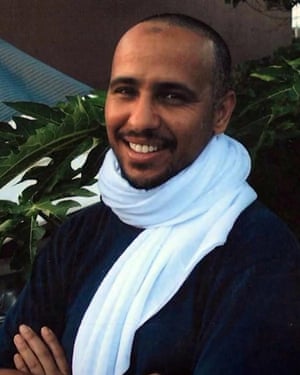
One of those witnesses was Mohamedou Ould Slahi, whose Guantánamo Diaryopens as he is stripped, made to wear a diaper, and shackled aboard Aero’s Gulfstream in Amman, Jordan, in July 2002.
Appearing by Skype from his home country of Mauritania, Slahi faced questions from a panel that included a former chief prosecutor of the international war crimes tribunal, a multi-tour veteran of the Iraq and Afghan wars, a Baptist minister, and a local social worker.
How, the commissioners asked, can we advance an accountability process our elected officials have shunned?
It is a question that North Carolinians have wrestled with before. In 1979, Ku Klux Klan and American Nazi party members opened fire at an anti-Klan rally in Greensboro, leaving five dead. State and federal trials ended in acquittals, and a civil lawsuit raised more questions than it answered about the actions of city officials and police during the event.
Now the North Carolina Commission of Inquiry on Torture aims to find a way forward from one of 21st-century America’s darkest episodes – the global operation to seize, interrogate and torture terrorism suspects that Aero Contractors facilitated from the Johnston County airport, a rustic, single runway airstrip 30 miles south-east of Raleigh.
Allyson Caison, a local realtor, first heard the CIA was running “a secret little operation” out of the airport around a Boy Scout campfire in 1996. The subject came up again in the early 2000s, when a relative who was a recreational pilot landed at the airport and marveled at its state-of-the-art runway.
She didn’t know that the “little operation” a former Air America pilot set up years ago in a nondescript blue hangar tucked into the pines employed more than 120 people, or that the Gulfstream jet she would hear taking off and landing was one of the most prolific spiders in what the Council of Europe has called a “web spun across the world” by the CIA’s rendition, detention and interrogation operations.
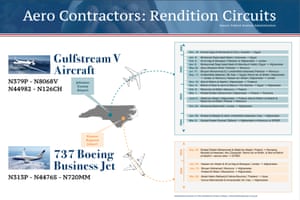
In April 2005, the New York Times ran a story titled “CIA Expanding Terror Battle Under Guise of Charter Flights” that lifted the lid on Aero’s rendition flights. Later that year, 40 peace activists from St Louis joined Christina Cowger and other local residents to protest against the company’s role in the CIA’s torture program.
“It turned out I knew two of the three Aero principals well,” Caison said during a tour around the airport the day before the commission’s hearings convened. “These were prominent, well-respected business people in our community. Their children and mine were schoolmates. I baked their gingerbread houses for Christmas.”
From 2001 to 2004 Aero’s Gulfstream, operated under the tail number N379P, and a second, larger Boeing 737 Aero stationed at Kinston regional jetport in nearby Lenoir County, carried out scores of rendition missions. Together, they accounted for roughly 80% of all the CIA renditions during those years, landing more than 800 times in countries throughout Europe, the Middle East and North Africa. The Gulfstream was in and out of Guantánamo so often it earned the nickname the Guantánamo Express.
To drive with Caison around the airport is to get a sense of how much nerve this kind of neighbor-to-neighbor activism takes. In the gleaming new Johnston County airport terminal, the young airport manager greeted her with a wary handshake and a gently drawled apology that he could not attend the commission’s hearings.
Down the road, at the recently fortified automatic gate that blocks the access road to Aero’s hangar, there was no pretense of hospitality. It was lunch hour, and a line of cars was filing out the gate. Each slowed at the sight of Caison’s car. One driver, glaring, almost clipped her side view mirror as he inched past.
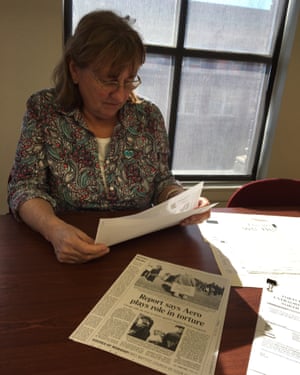
Caison said: “I really think we’ve changed some hearts and minds around here. People are quiet about it because of Aero’s long tentacles. But we’ve been persistent. It’s the strength of our little group. We’ve accomplished a lot.”
North Carolina Stop Torture Now has had an impact over the last 10 years. Recently released minutes of a closed 2007 meeting of the airport authority in Kinston, where Aero housed its larger 737 rendition jet, confirmed that Aero sold its hangar at the facility that year. When a member of the airport’s board asked its executive director why the company was leaving, the director “explained that Aero Contractors had not had the aircraft in the hangar for several months due to the negative publicity they were getting from Stop Torture Now”.
The campaign scored successes at state level and in Washington too. In Raleigh, the group pressed the governor and state attorney general to open a criminal investigation into Aero’s rendition operations. Told that the state had no jurisdiction, the group drew on a growing network of support from churches to press for legislation to make participating in CIA kidnappings, enforced disappearances and torture state crimes.
The bill twice stalled in committee, but attracted 12 bipartisan co-sponsors and brought the question of rendition for torture before religious congregations throughout the state.
Pressure is also credited with helping persuade Senator Richard Burr, then the ranking Republican on the Senate intelligence committee, to join in voting to declassify the executive summary of the Senate’s scathing report on the CIA torture program in 2014.
Although that report only examined the treatment of prisoners inside the CIA’s black sites around the world, its release sparked hopes for greater accountability over the rendition to bring suspects to interrogation.
Burr, now chair of the Senate’s intelligence committee, has made clear there will be no further official reckoning for the agency’s post-9/11 human rights violations, and has sought to recall and destroy all copies of the still-classified Senate report.
For the volunteer commissioners of the North Carolina Commission of Inquiry on Torture, this is where their responsibility begins.
“With no meaningful accountability from government leaders, it’s been left to citizens to keep this issue alive,” commission co-chair Jennifer Daskal, a law professor at American University, explained in a break in the hearings.
“We don’t have the power to prosecute, but we can offer an accounting of what happened, and of the costs, to prevent this from happening again.”
“I believe in accountability. I’ve done accountability,” said David Crane, who served as the founding chief prosecutor of the international tribunal that prosecuted Liberian president Charles Taylor for war crimes and who lives in North Carolina’s Great Smoky Mountains.
“Torture is a clearcut issue: you don’t torture. The American people just need to know the raw facts, and many of those facts are right here in North Carolina.”
The commission invited Aero Contractors to give testimony at the hearings, but received no response. Invitations to the governor, attorney general and several Johnston County officials to attend or send representative to the hearings also went unanswered. Calls to the county manager and county commissioners seeking comment on the hearings and Aero’s operations were not returned.

The North Carolina Commission of Inquiry on Torturewill collect evidence through the spring, pressing for the release of public records from county and state officials and compiling research and testimony on the lasting harms inflicted by Aero’s rendition flights. It plans to release its final report this summer.
But the commission’s hearings also sharpened their sense of personal responsibility to repair the harm they see caused by Aero’s operations.
“As a person of faith, I have to be involved in this,” Caison told the commission near the end of the hearing. “As a mom of two boys, I like to think that if my boys were kidnapped, renditioned and tortured, there would be another mom out there at the other end like me, trying to end an injustice that starts in her neighborhood.”
For Cowger, the priority now is to address the physical and psychological health of those who survived Aero’s rendition flights – a process that involves “acknowledgement, genuine apology, and some form of redress”.
“The commission demonstrates by its very being that we are not helpless,” she said.